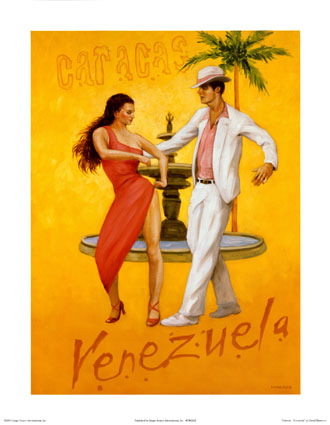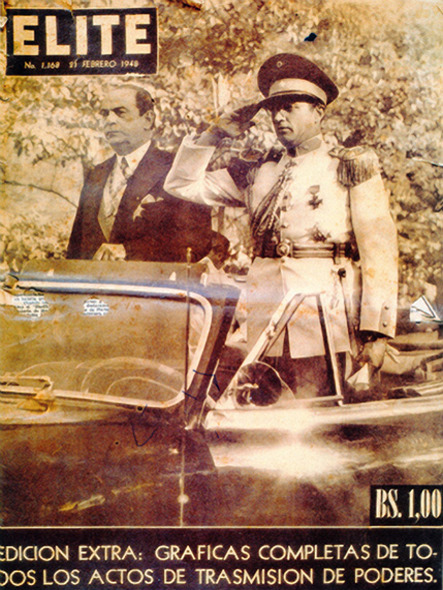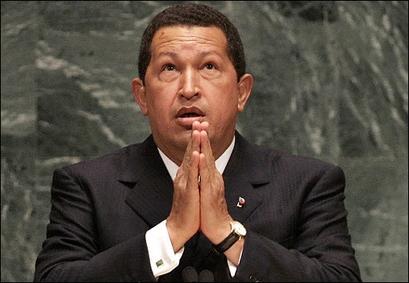
By Nick Li
1948 was a momentous year in world history. In line with the mission statement for this blog I thought it would be interesting to consider the importance of 1948 for one particular country that generates more than its fair share of news, Venezuela. It turns out that a few facts and a little historical context goes a long way towards explaining why Hugo Chavez is so popular in Venezuela, and why claims that he has been the worst disaster ever to hit Venezuela are exaggerated.  In February 1948, Venezuelan democracy got off to a rocky start. Romulo Gallegos (left on the picture) was inaugurated as the first democratically elected President, whose Accion Democratica party had achieved 73% of the vote in the elections of 1947. The first mistake of the new administration was believing that such an overwhelming mandate meant anything in a country dominated by an elite comprised mainly of oil interests, large landowners, the catholic church and the military. By taxing 50% of oil profits, creating plans for wide-ranging land reforms, increasing public secular education, and decreasing military budgets and military representation in the cabinet, Gallegos and the Accion Democratica party managed to simultaneously alienate all four of the elite groups. It was only a matter of time before the elite acted to protect its own interests. As it turned out, it took only 8 months – in mid-November 1948, a bloodless military coup deposed Gallegos and sent him and his party into exile. The previous constitution and reforms were all immediately reversed, and a military junta under the control of Marcos Perez Jimenez. Perez Jimenez ruled until 1958, four years after the birth of Hugo Rafael Chavez Frias to a mulatto man and mestizo women in the town of Sabaneta. The standard story for the 1958-1998 period is that "to the beginning of the 1980s the Venezuelan economy was one of the strongest in South America" and Venezuela enjoyed greater democracy than most of its Latin American neighbours. But what about the forces that led to the coup of 1948? Were they subdued under the constraints of an enlightened, democratic government that managed to either (a)address the massive inequality of wealth and income, (b)increase efficiency and economic growth, thereby alleviating some of the need for redistribution, or (c)both? The impression one gets sometimes from reading the vitriolic criticism of Chavez by the Wall Street Journal (read the latest anti-Chavez article here and right-wing blogs (here for example) is that Venezuela was humming along just fine until Chavez came along with his crazy ideas and ruined a functioning democracy with a functioning economy. A closer look at the record indicates that things were going downhill long before Chavez came along. The initial promise of Venezuelan democracy, with its high hopes of economic growth, justice, and democracy that was born in 1948 died in 1948. The most damning evidence against all of the democratic governments of Venezuela before Chavez is the economic record. While Venezuela started very favourably compared to its neighbours due to oil riches, it has had negative growth in GDP per capita (measured in constant 2000 US$ or constant 2000 International PPP dollars) since 1977. Compared to its South American neighbours, who are hardly economic success stories themselves, this is a horrible record, almost without equal in the 20th century. There are plenty of economic stories that one could tell for low rates of economic growth over long periods, or negative growth over short periods, especially for an oil-dependent economy like Venezuela, but a negative growth trend over 50 years is just terrible. The surprising thing is that someone like Chavez didn’t come along sooner. Whether one blames neoliberal economic policies or the standard Latin American overregulation and trade distortions, it is clear that the system in place before Chavez was in trouble.
In February 1948, Venezuelan democracy got off to a rocky start. Romulo Gallegos (left on the picture) was inaugurated as the first democratically elected President, whose Accion Democratica party had achieved 73% of the vote in the elections of 1947. The first mistake of the new administration was believing that such an overwhelming mandate meant anything in a country dominated by an elite comprised mainly of oil interests, large landowners, the catholic church and the military. By taxing 50% of oil profits, creating plans for wide-ranging land reforms, increasing public secular education, and decreasing military budgets and military representation in the cabinet, Gallegos and the Accion Democratica party managed to simultaneously alienate all four of the elite groups. It was only a matter of time before the elite acted to protect its own interests. As it turned out, it took only 8 months – in mid-November 1948, a bloodless military coup deposed Gallegos and sent him and his party into exile. The previous constitution and reforms were all immediately reversed, and a military junta under the control of Marcos Perez Jimenez. Perez Jimenez ruled until 1958, four years after the birth of Hugo Rafael Chavez Frias to a mulatto man and mestizo women in the town of Sabaneta. The standard story for the 1958-1998 period is that "to the beginning of the 1980s the Venezuelan economy was one of the strongest in South America" and Venezuela enjoyed greater democracy than most of its Latin American neighbours. But what about the forces that led to the coup of 1948? Were they subdued under the constraints of an enlightened, democratic government that managed to either (a)address the massive inequality of wealth and income, (b)increase efficiency and economic growth, thereby alleviating some of the need for redistribution, or (c)both? The impression one gets sometimes from reading the vitriolic criticism of Chavez by the Wall Street Journal (read the latest anti-Chavez article here and right-wing blogs (here for example) is that Venezuela was humming along just fine until Chavez came along with his crazy ideas and ruined a functioning democracy with a functioning economy. A closer look at the record indicates that things were going downhill long before Chavez came along. The initial promise of Venezuelan democracy, with its high hopes of economic growth, justice, and democracy that was born in 1948 died in 1948. The most damning evidence against all of the democratic governments of Venezuela before Chavez is the economic record. While Venezuela started very favourably compared to its neighbours due to oil riches, it has had negative growth in GDP per capita (measured in constant 2000 US$ or constant 2000 International PPP dollars) since 1977. Compared to its South American neighbours, who are hardly economic success stories themselves, this is a horrible record, almost without equal in the 20th century. There are plenty of economic stories that one could tell for low rates of economic growth over long periods, or negative growth over short periods, especially for an oil-dependent economy like Venezuela, but a negative growth trend over 50 years is just terrible. The surprising thing is that someone like Chavez didn’t come along sooner. Whether one blames neoliberal economic policies or the standard Latin American overregulation and trade distortions, it is clear that the system in place before Chavez was in trouble. The record of social achievements is just as poor. Despite starting out very rich compared to its neighbours, Venezuela had lower Primary and Secondary School Enrollment Rates throughout the 1990s. The promise of 1948, that oil revenues could help fund sustainable economic development and improve education, was clearly not kept by the various governments before Chavez. This is really quite amazing, because as Chavez has shown in the last 7 years, it is not that hard to spend oil money to hire teachers, build schools, and abolish school fees. By making education free and improving access, Chavez has increased primary enrollment from 85% to 91% and secondary enrollment from 47% to 63% over 6 years. It is important not to overstate the importance of these indicators for actual social welfare, as any Cuban with a graduate degree who waits tables or drives a taxi will gladly tell you, but the fact that the successive Venezuelan governments, however democratic, failed to deliver comparable educational outcomes to much poorer neighbouring countries (with no oil revenues) stands out as a major failure.
What about democracy? The restoration of civilian democratic rule in 1958, 10 years after the fateful coup, brought renewed promise. However, in the 1960s the Accion Democratica party and Christian Democratic Party (COPEI) agreed to limit Venezuela’s elections to an exclusive competition between these two parties, known as puntofijismo. Yes, Ralph Nader would have had a field day. This need not have been a bad thing – countries with decades of one-party rule have often had incredible records of economic growth and social development – but as it turns out this system served primarily to preserve the status quo. Somehow, this system persevered for 12 years of negative economic growth until discontent reached a boil with the Caracazo protests and riots of 1989. These protests were triggered by a plan to implement free-market reforms recommended by the IMF, including privatization. The response was to suspend civil liberties and allow the military to crack down on protestors, killing up to 3000. The Caracazo was part of the motivation for Chavez’ failed coup attempt in 1992.
 Chavez is rightly criticized for his many undemocratic actions and often foolish economic policies. Yet it is some of the simplest and most logical things that he has done, like taking control of Venezuelan oil wealth and using it to fund social programs, that ensure his continued popularity. A historical perspective that stretches back to 1948 puts Chavez’ actions in context and proportion. Yes, Chavez has ruined the economy. Yes, his social programs may not be sustainable after the oil wealth runs out. Yes, his "I smell sulphur" speech to the UN was one of the greatest pieces of political theatre we have witnessed since the famous banging of the shoe. Yes, his plan to pull Venezuela out of the World Bank and IMF and start a "Bank of the South" is probably a little far-fetched. But Venezuela was hardly on a democratic, economic growth track before. Decades of "democratic" rule did not deliver a rising standard of living for the average Venezuelan, did not improve social programs, and may have left the economy worse off. It would be a huge mistake to assume that handing power over to Chavez’ vocal domestic opposition would lead to an embrace of an uncensored press, better labour rights, and fairer elections, just like it would be a huge mistake to believe that countries that follow IMF advice have better economic outcomes (just look at Argentina). When judged properly in historical perspective, Chavez is no angel. He has betrayed many of the original dreams of 1948 by increasing the role of the military in Venezuelan politics and life, increasing military budgets, and by restricting democracy. Neither, however, is he the worst thing to ever happen to Venezuela. His record on growth and democracy is neither better nor worse than his predecessors, and he has at least managed to achieve some progress on education, wealth, and a more equitable distribution of the oil wealth. – Nick
Chavez is rightly criticized for his many undemocratic actions and often foolish economic policies. Yet it is some of the simplest and most logical things that he has done, like taking control of Venezuelan oil wealth and using it to fund social programs, that ensure his continued popularity. A historical perspective that stretches back to 1948 puts Chavez’ actions in context and proportion. Yes, Chavez has ruined the economy. Yes, his social programs may not be sustainable after the oil wealth runs out. Yes, his "I smell sulphur" speech to the UN was one of the greatest pieces of political theatre we have witnessed since the famous banging of the shoe. Yes, his plan to pull Venezuela out of the World Bank and IMF and start a "Bank of the South" is probably a little far-fetched. But Venezuela was hardly on a democratic, economic growth track before. Decades of "democratic" rule did not deliver a rising standard of living for the average Venezuelan, did not improve social programs, and may have left the economy worse off. It would be a huge mistake to assume that handing power over to Chavez’ vocal domestic opposition would lead to an embrace of an uncensored press, better labour rights, and fairer elections, just like it would be a huge mistake to believe that countries that follow IMF advice have better economic outcomes (just look at Argentina). When judged properly in historical perspective, Chavez is no angel. He has betrayed many of the original dreams of 1948 by increasing the role of the military in Venezuelan politics and life, increasing military budgets, and by restricting democracy. Neither, however, is he the worst thing to ever happen to Venezuela. His record on growth and democracy is neither better nor worse than his predecessors, and he has at least managed to achieve some progress on education, wealth, and a more equitable distribution of the oil wealth. – Nick

Hi Annis S,
Thanks for your comment. I confess to never having been to Venezuela, but the economic data speak for themselves. Unless you are questioning of the World Bank’s economic statistics, the GDP and education figures are what they are – things have not gotten worse under Chavez. Now I would be a fool if I didn’t believe that many upper and middle class Venezuelans have suffered economically, or that some freedoms have been reduced.
I have a lot of sympathy for middle-class Venezuelans and I don’t think Chavez’ brand of class-warfare is very good for long-run economic development. But what you had before him was just the opposite form of class-warfare that pervades Latin America and keeps it among the most unequal regions on earth, with a super-rich elite and huge pools of poverty. If Venezuela had right-wing leaders who were actually competent economic managers (like El Salvador or Chile) I might be inclined to agree with you, but my point is that it did not. When inequality is bad AND growth is bad, there is not much to recommend a government.
I read what you wrote and I was just wondering are you Venezuelan? And a better question then that is have you lived in Venezuela for the last 10 years? If the answer is No then you really have no idea what it is like to live under the power of a president like Chavez and you also have not seen the changes that have come from before 1998 to now…
So once you go live in the poverty that most of us as Venezuelans live in and the struggles we have with the simpliest of daily activities because of Chavez then write your artical. At least then you will be fully educated of the reality of VENEZUELAN life.
Great post. Just a couple of thoughts:
1) Romulo Gallegos was the first democratically elected liberal president, but he wasn’t the first democratically elected president, nor was he the first liberal president.
Gallegos’ predecessor was Romulo Betancourt, who was just as liberal. Betancourt came to power in a coup, but turned out to be a democrat and a reformist. He was also a very shrewd politician… which, alas, Gallegos was not.
2) Gallegos spent several years in exile in Spain. I think he left before the Civil War broke out, but he probably saw the polarization and trauma of prewar Spanish society. This may have affected his attitudes towards the military and the Church.
3) Gallegos was a novelist first, then a politician. This may also help explain why he turned out to be a bad politician…
4) The United States seems to have had little role in the ’48 coup, either for or against. This was partly because in 1948 the US had a lot of other stuff going on, and partly because the Truman administration — in sharp contrast to some later US governments — just wasn’t very interested in Latin America.
cheers,
Doug M.